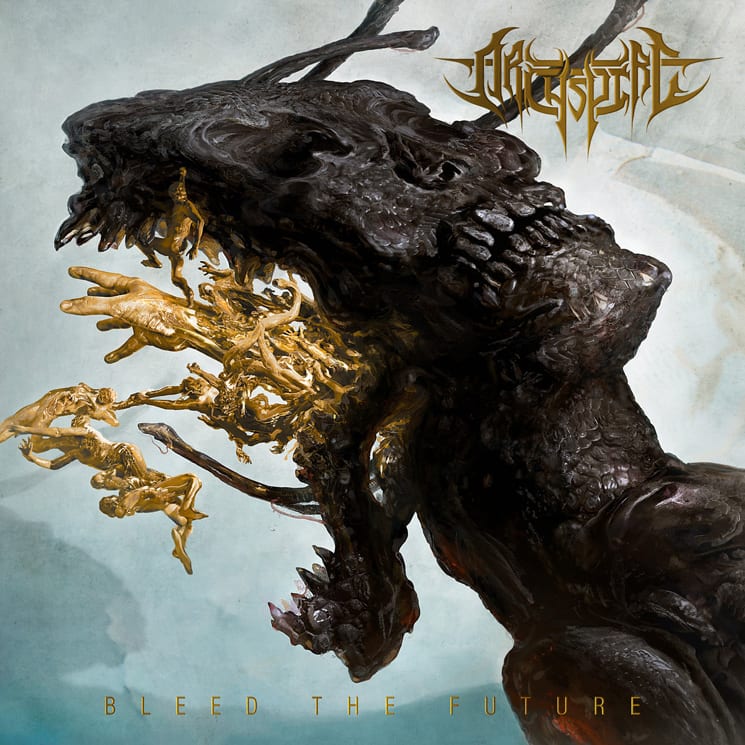There's no arguing that when it comes to technical death metal, Canada knows what's up. Several of the genre's modern key players hail from our country, including Archspire, inarguably one of metal's fastest-playing bands. Each of Archspire's albums has topped the last, most recently with 2017's Relentless Mutation showcasing a mind-bending display of extremity in every sense of the word, and begging the question: how will the band follow it up?
A day may come when an Archspire album fails to live up to its predecessor, but as demonstrated by Bleed the Future, that day is a long time away. Only seconds into the album, it's clear that the band's footing has never been steadier, as the hyper-speed attack of "Drone Corpse Aviator," with its carpal tunnel-inducing instrumentation and lung-flattening vocal delivery, launches the listener immediately into tech-death oblivion.
The seven tracks to follow offer up the same frenzy of dizzying speed and crushing heaviness, but with enough variation in the techniques, rhythms and song structures to keep the album from sounding repetitive. Any song from the album could serve as a perfect example of what Archspire is, but its three lead singles, "Drone Corpse Aviator," "Bleed the Future" and "Golden Mouth of Ruin" probably do it best. One of the best things about these tracks is how the musicians manage to show off their chops in a way that contributes to the songs, and aren't just showboating for the sake of it.
Most of Bleed the Future's tracks contain clean guitar-driven instrumental passages, and the instantaneous jumps back and forth between these and the album's chaotic onslaughts do a lot to accentuate the intricacies of the songs. Though not everyone may agree — album closer "A.U.M." starts with a recording of a friend of drummer Spencer Prewett's, telling the band to stop playing beautifully and "bring back the fucking danger" — Archspire's ability to work melody into vigorously heavy music is uncanny.
The album is only eight tracks in length, the longest of which clocks in at under five minutes, but to say Bleed the Future is short would be a disservice to the musicianship and songwriting of this mind-bogglingly talented quintet. If it were any other band playing these songs, the record would be an awful lot longer. So to clarify — Bleed the Future isn't short, it's just really, really fast. All in all, it's a brain-melter of an album, and Archspire's best by a significant margin. They've certainly got their work cut out for them for the next time around.
(Season of Mist)A day may come when an Archspire album fails to live up to its predecessor, but as demonstrated by Bleed the Future, that day is a long time away. Only seconds into the album, it's clear that the band's footing has never been steadier, as the hyper-speed attack of "Drone Corpse Aviator," with its carpal tunnel-inducing instrumentation and lung-flattening vocal delivery, launches the listener immediately into tech-death oblivion.
The seven tracks to follow offer up the same frenzy of dizzying speed and crushing heaviness, but with enough variation in the techniques, rhythms and song structures to keep the album from sounding repetitive. Any song from the album could serve as a perfect example of what Archspire is, but its three lead singles, "Drone Corpse Aviator," "Bleed the Future" and "Golden Mouth of Ruin" probably do it best. One of the best things about these tracks is how the musicians manage to show off their chops in a way that contributes to the songs, and aren't just showboating for the sake of it.
Most of Bleed the Future's tracks contain clean guitar-driven instrumental passages, and the instantaneous jumps back and forth between these and the album's chaotic onslaughts do a lot to accentuate the intricacies of the songs. Though not everyone may agree — album closer "A.U.M." starts with a recording of a friend of drummer Spencer Prewett's, telling the band to stop playing beautifully and "bring back the fucking danger" — Archspire's ability to work melody into vigorously heavy music is uncanny.
The album is only eight tracks in length, the longest of which clocks in at under five minutes, but to say Bleed the Future is short would be a disservice to the musicianship and songwriting of this mind-bogglingly talented quintet. If it were any other band playing these songs, the record would be an awful lot longer. So to clarify — Bleed the Future isn't short, it's just really, really fast. All in all, it's a brain-melter of an album, and Archspire's best by a significant margin. They've certainly got their work cut out for them for the next time around.




